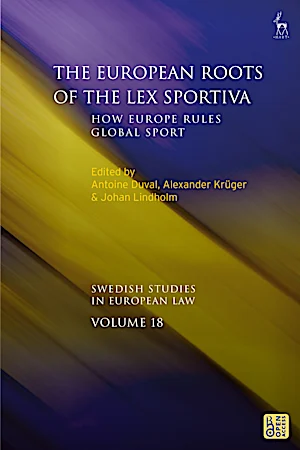Dear readers,
I have the pleasure to inform you that our (with Prof. Johan Lindholm and Alexander Kruger from Umeå University) edited volume entitled 'The European Roots of the Lex Sportiva: How Europe Rules Global Sport' has been published Open Access by Hart Publishing.

You can freely access the volume at: https://www.bloomsburycollections.com/monograph?docid=b-9781509971473
Abstract:
This open access book explores the complexity of the lex sportiva, the transnational legal regime governing international sports. Pioneering in its approach, it maps out the many entanglements of the transnational governance of sports with European legal processes and norms. The contributors trace the embeddedness of the lex sportiva within national law, European Union law and the European Convention on Human Rights. While the volume emphasizes the capacity of sports governing bodies to leverage the resources of national law to spread the lex sportiva globally, it also points at the fact that European legal processes are central when challenging the status quo as illustrated recently in the Semenya and Superleague cases. Ultimately, the book is also a vantage point to start critically investigating the Eurocentricity and the complex materiality underpinning the lex sportiva.
Table of contents:
1. Made in Europe: Lex Sportiva as Embedded Transnational Law - 1–14 - Antoine Duval , Alexander Krüger and Johan Lindholm
I. The European Roots of Lex Sportiva
2. Embedded Lex Sportiva: The Swiss Roots of Transnational Sports Law and Governance - 17–40 - Antoine Duval
3. Putting the Lex into Lex Sportiva: The Principle of Legality in Sports - 41–68 - Johan Lindholm
4. Europeanisation of the Olympic Host (City) Contracts - 69–92 - Yuliya Chernykh
5. The Influence of European Legal Culture on the Evolution of Lex Olympica and Olympic Law - 93–118 - Mark James and Guy Osborn
6. Who Regulates the Regulators? How European Union Regulation and Regulatory Institutions May Shape the Regulation of the Football Industry Globally - 119–152 - Christopher A Flanagan
7. The Europeanisation of Clean Sport: How the Council of Europe and the European Union Shape the Proportionality of Ineligibility in the World Anti-Doping Code - 153–188 - Jan Exner
II. The Integration of European Checks into the Lex Sportiva
8. False Friends: Proportionality and Good Governance in Sports Regulation - 191–210 - Mislav Mataija
9. Sport Beyond the Market? Sport, Law and Society in the European Union - 211–228 - Aurélie Villanueva
10. EU Competition Law and Sport: Checks and Balances ‘à l’européenne’ - 229–256 - Rusa Agafonova
11. Is the Lex Sportiva on Track for Intersex Person’s Rights? The World Athletics’ Regulations Concerning Female Athletes with Differences of Sex Development in the Light of the ECHR - 257–282 - Audrey Boisgontier
III. Engaging Critically with a Eurocentric Lex Sportiva
12. Lex Sportiva and New Materialism: Towards Investigations into Sports Law’s Dark Materials? 285–308 - Alexander Krüger